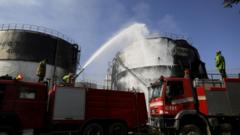A senior Palestinian official has stated that negotiations for a Gaza ceasefire and hostage release are nearing completion, with remaining disputes centering on the Israeli military's presence and prisoner exchanges. As the situation evolves, key stakeholders remain cautiously optimistic about a resolution.
Ceasefire Negotiations Near Completion as Key Issues Persist in Gaza Conflict

Ceasefire Negotiations Near Completion as Key Issues Persist in Gaza Conflict
Talks for a ceasefire deal in Gaza are reportedly 90% finalized, with critical discussions still ongoing about military presence and prisoner exchanges.
Efforts to finalize a ceasefire agreement in the Gaza Strip are reportedly nearing completion, according to a senior Palestinian official involved in the discussions. The official informed the BBC that the talks are approximately 90% finished, but several pivotal issues must still be addressed before a deal can be struck.
A significant area of contention pertains to the Israeli military presence in the strategically vital Philadelphi corridor, which runs along the Israeli-Egyptian border in southern Gaza. The talks, taking place in Doha, involve discussions about establishing a buffer zone several kilometers wide along this border. According to the official, Israel would maintain a military presence within this proposed area.
If these negotiations succeed, a phased ceasefire could be established within days. The outline of the agreement includes a prisoner exchange strategy, proposing the release of 20 Palestinian prisoners in exchange for each female soldier freed during the initial phase of the ceasefire. While the specific names of the prisoners have not been finalized, a pool of around 400 inmates serving lengthy sentences is being considered, excluding notable figures such as Fatah leader Marwan Barghouti, who is likely to be vetoed by Israel.
Israeli hostages are expected to be released in stages, as Hamas reportedly continues to locate some individuals still unaccounted for. Current estimates from Israel suggest that out of 96 hostages believed to be held in Gaza, 62 are presumed alive.
In addition, a proposed arrangement would facilitate the return of Gazan civilians to northern regions, contingent on oversight from Egypt and Qatar. The logistics plan includes an influx of around 500 aid trucks daily into Gaza.
The final component of the proposed three-stage ceasefire would see Gaza managed by a committee of technocrats without prior political affiliations, who would operate with support from various Palestinian factions.
Recently, mediation attempts by the US, Qatar, and Egypt have intensified, reflecting an increased willingness from both Israel and Hamas to move towards a resolution. Previous talks, held in mid-October, failed when Hamas rejected an immediate ceasefire proposal. In a recent statement, Hamas, alongside two other armed Palestinian factions, indicated that the likelihood of reaching a ceasefire agreement has improved, provided that Israel ceases to impose additional conditions.
The backdrop to these discussions stems from a violent escalation that began with a significant cross-border attack by Hamas on October 7, 2023, resulting in approximately 1,200 fatalities and over 250 abductions. Since then, more than 100 hostages have been released, either through negotiations or military operations conducted by Israel.


















